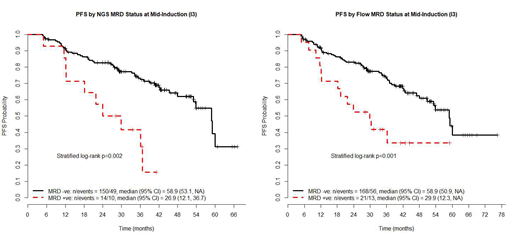Initial therapy for MCL is effective, but most patients eventually relapse. Validated intermediate biomarkers for MCL are important to provide early assessment of treatment efficacy, prognostic information and potentially guide consolidation. The US-Canadian Intergroup trial E1411 randomly assigned patients (pts) to receive induction with BR ± bortezomib (V), followed by consolidation with R ± L. As a planned correlative, MRD was assessed after cycle 3 (I3), end of induction (EOI) and after 4 cycles of consolidation (C4) by two methods: a research version of clonoSEQ® a next generation sequencing (NGS) MRD assay, (Adaptive Biotechnologies, Seattle, WA) that leverages multiplex PCR followed by NGS to identify and track rearrangements of IgH, V-J, D-J and IgK/L loci as well as translocations in Bcl1/2-IgH, and flow cytometry (FC) (I3 and EOI only) at a central laboratory (Mayo Clinic). While outcomes by treatment arm remain blinded, we report here the results of the MRD assessments by each method and the associated progression free survival (PFS).
In E1411, 373 pts, accrued between May 2012 - Sept. 2016, were randomly assigned (stratified by MIPI and age (</≥60)) to receive BR induction x 6 followed by R for 2 years, BVR followed by R, BR followed by LR or BVR followed by LR. Eligible pts were ≥ age 18 and had untreated MCL, ECOG PS 0-2, and adequate hematologic and organ function. Of the 373 pts, 296 (79%) consented to correlatives. Of these, 255 (86%) had baseline NGS samples, and 214 were analyzable. Excluded were 6 patients that were protocol ineligible, 20 without clinical follow-up; only 7 (2.7%) patients were ineligible due to inability to identify a dominant clone necessary to follow MRD by the NGS method. At baseline pre-treatment, NGS detected a dominant clone in bone marrow (BM) or peripheral blood (PB) in 92%, with only 17 (8%) requiring study of biopsy tissue. Of the 296, 240 had baseline FC data, 9 were protocol exclusions, leaving 231 analyzable. FC detected a non-MCL monoclonal B cell lymphocytosis clone in a small number of cases. While NGS may have higher sensitivity, as FC sensitivity is 10-4, for this analysis we used that cutoff for both NGS and FC. Cohen's Kappa statistic compares concordance between MRD pairs, and p-value is from exact McNemar's test.
BR-based initial MCL therapy achieved early MRD negativity (< 10-4) in a high proportion of patients. Analyzing PB at mid-induction (I3): by NGS 89% MRD-, 9% MRD+ and 2% indeterminate, whereas by FC 87% MRD-, 12% MRD+ and 1% indeterminate. Concordance was high with 127 MRD- by both methods, 13 MRD+ by both, and 6 NGS-/FC+ (Kappa Statistic = 0.79, p-value = 0.031). By NGS, of 12 pts MRD+ at I3, 7 became MRD- at EOI, and 4 remained MRD+ (1 indeterminate). Analyzing at EOI: MRD- rates were 91% by NGS analysis of PB (147/161) and 90% in BM (96/107), vs 95% (174/183) by FC in PB. As some were indeterminate, only 7% were MRD+ by NGS in BM, 3% by NGS in PB and 5% by FC. In 88 informative samples with EOI NGS in both BM and PB, concordance was high, with 81 negative in both, 1 positive in both and 6 BM+/PB- (Kappa Statistic = 0.23, p-value = 0.031). Of 101 pts with data at all 3 timepoints, I3, EOI, and C4: 7 were MRD+ at I3, 5 of these were MRD- at EOI, but 2 of these 5 were again MRD+ at C4. Of 2 MRD+ EOI, 1 became MRD- at C4. By FC, of 17 patients MRD+ at I3, 11 (65%) became MRD- at EOI.
MRD status correlated with progression-free survival (PFS). Due to the low MRD+ rate at EOI and C4, we focus here on MRD status at I3 (10-4 cutoff for both NGS and FC), using a landmark analysis of 4 months on study. Median PFS (Figure) for pts MRD- at I3 mid-induction was 58.9 months by either NGS or FC, while for those MRD+ by NGS it was 26.9 months, vs 29.9 months MRD+ by FC.
Conclusions: Both NGS and FC were feasible to assess MRD status in this multi-center trial. Results of NGS and FC are concordant at the 10-4 cutoff. NGS can be more sensitive when adequate material is available, and analysis of this subgroup is ongoing. The high MRD- rate (≥ 90%) at EOI in this BR-based trial and MRD correlation with PFS supports its use as a platform for MCL trials, although consolidation may confound PFS. Early interim MRD testing at cycle 3 identifies a high-risk population who may benefit from alternative treatment strategies. Analysis by treatment arm with longer follow-up, as well as comparison with centrally reviewed PET/CTs included in this study, will help define the most informative method(s), cutoff values, and timing for assessing degree of response in MCL.
Smith:Astra-Zeneca: Honoraria, Membership on an entity's Board of Directors or advisory committees, Speakers Bureau; EUSA: Honoraria, Membership on an entity's Board of Directors or advisory committees, Speakers Bureau. Parekh:Foundation Medicine Inc.: Consultancy; Celgene Corporation: Research Funding; Karyopharm Inc.: Research Funding. Martin:Sandoz: Consultancy; Karyopharm: Consultancy; Teneobio: Consultancy; Celgene: Consultancy; Janssen: Consultancy; I-MAB: Consultancy. Till:Mustang Bio: Patents & Royalties, Research Funding. Leonard:Gilead: Consultancy; Akcea Therapeutics: Consultancy; Bayer Corporation: Consultancy; Genentech, Inc./F. Hoffmann-La Roche Ltd: Consultancy; BeiGene: Consultancy; Celgene: Consultancy; Akcea Therapeutics: Consultancy; Nordic Nanovector: Consultancy; ADC Therapeutics: Consultancy; Sandoz: Consultancy; MorphoSys: Consultancy; Sutro Biopharma: Consultancy; Karyopharm Therapeutics: Consultancy; Karyopharm Therapeutics: Consultancy; Merck: Consultancy; Genentech, Inc./F. Hoffmann-La Roche Ltd: Consultancy; Epizyme, Inc: Consultancy; Gilead: Consultancy; AstraZeneca: Consultancy; Epizyme, Inc: Consultancy; Bayer Corporation: Consultancy; Miltenyi: Consultancy; Celgene: Consultancy; ADC Therapeutics: Consultancy; MorphoSys: Consultancy; Sandoz: Consultancy; Miltenyi: Consultancy; AstraZeneca: Consultancy; Nordic Nanovector: Consultancy; Merck: Consultancy; BeiGene: Consultancy; Sutro Biopharma: Consultancy. Friedberg:Bayer: Honoraria, Other: Data & Safety Monitoring Committee; Acerta: Other: Data & Safety Monitoring Committee. Kahl:TG Therapeutics: Consultancy; ADC Therapeutics: Consultancy, Research Funding; Seattle Genetics: Consultancy; BeiGene: Consultancy.
Author notes
Asterisk with author names denotes non-ASH members.


This feature is available to Subscribers Only
Sign In or Create an Account Close Modal